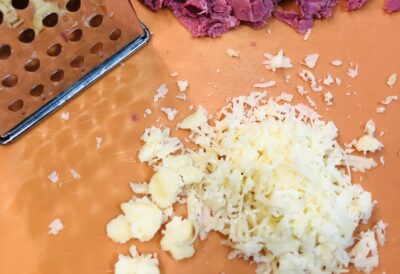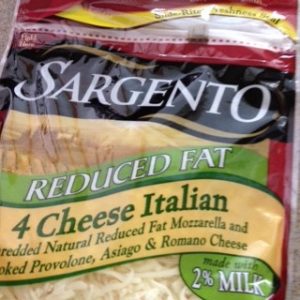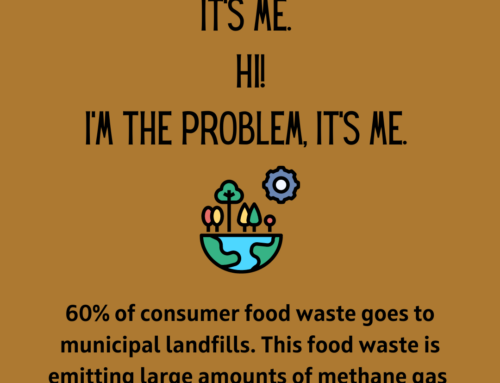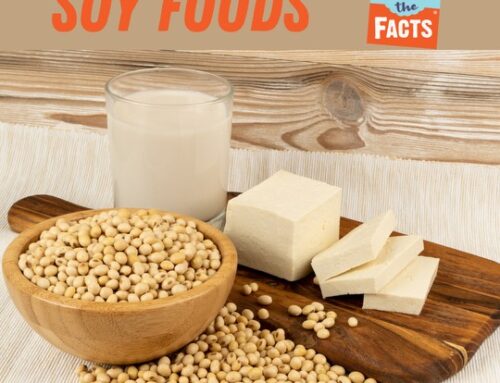If you’ve been reading my blog for a while, you’ve probably noticed that I try to dispel myths and switch the focus to learning how to eat in a healthy way (balance, variety, moderation, enjoyable) versus obsessing over any one ingredient, food or food group.

Recently I enjoyed an afternoon with a group of women. The topic of using pre-shredded cheese came up: “I don’t buy pre-shredded cheese. You should always just shred your own.” I, and the other registered dietitian in the room, exchanged glances, knowing we were both thinking: “Why would you avoid this product?”
“Because it has cellulose in it.”
We told them they shouldn’t worry about it. Two things –
- If you want to always shred your own cheese, fine. Go for it!
- But don’t make choices based on an unwarranted fear of something on an ingredient label. Instead, start asking yourself some questions: What is this ingredient and is it harmful? Is using this product going to help me eat a better diet overall (perhaps allow you more time to cook a meal at home, or allow you the ease to have ingredients on hand). Is avoiding this product going to significantly improve my dietary intake and health?
As registered dietitians, we’re trained in food and nutrition, but also continue to read, review, and take courses to stay up to date on the many aspects of our food supply, human eating behavior, and the applications of clinical nutrition. This information is delivered to our inbox every day. Some critics think we’re all in bed with the food industry (I’m not sure I even know what that means since our training includes study of “food” and nutrition). The bottom line is – people eat. It’s our job to know about the human body’s function as well as what’s in food. Our goal is to help consumers understand the potential benefits or harm from eating too much or too little of various foods.
Packaged shredded cheese is a staple in my refrigerator. I’m a cheese-lover, and always have bricks of cheese in my fridge as well (that I sometimes shred). However for those busy weeknight tacos or quesadillas, or when I need 2 tablespoons for quick flavor booster, (or for a quick-I-have-to-be-at-at-basketball-game-in-30-minutes-lasagna), pre-shredded cheese is a time-saver that works for many households.

The Label
So let’s take a look at a typical package of shredded cheese and its ingredient list.
Sargento’s 2% fat 4-Cheese Italian Blend: Reduced fat low moisture mozzarella cheese, reduced fat smoked provolone cheese, asiago medium and/or asiago fresh and Romano cheese, potato starch and powdered cellulose (to prevent caking), natamycin (a mold inhibitor).
Basically, this packaged shredded cheese contains – cheese; and two or three other ingredients that help keep it food-safe and easy to use: Potato Starch, Cellulose, and Natamycin.
Anti-caking Ingredients
Why would a food company want to add the anti-caking ingredients? Well, to provide customers with a consistently good product that doesn’t clump and therefore can stay in your fridge longer (for folks who don’t have time to run to the grocery store every other day or shred their own cheese every time they need a little shred).
I realize that ingredient terms that may not sound like “food” may invoke fear. There have been a lot of crazy headlines regarding cellulose for instance. When you do a search for “cellulose” some weird headlines come up: “18 Grossest Ingredients” (never believe something to be true from anyone who identifies something as “gross” or “yucky”), or “There’s wood pulp in your cheese!”.
Cellulose is actually naturally occurring ingredient. It’s a part of every plants cell, including most of the fruits and vegetables you eat. And yes, it’s in wood pulp, but there’s not wood pulp in your bag of shredded cheese.
Like the name clearly suggests, potato starch is a starch (which is a complex carbohydrate) and is also added as an anti-caking agent..
Antimicrobials
Natamycin, also safe, is an antimicrobial that prevents mold and yeast growth, and thereby enhances a product’s shelf life. It’s reliable and safe to the human body.
So….Why?
Why is there all of this food-fear mongering going on? Unless you want to completely make everything you eat from scratch (bake your own bread, make your own butter, grow your own vegetables and grains), a few packaged foods won’t kill you.
The ingredients used are safe, and have a purpose (the whole idea of utilizing some packaged food is not just the time-savings, but also the ability to keep things on the shelf for longer periods.). The food industry also plays an important role with overall food waste reduction by utilizing foods grown. Ingredients, such as cellulose, help to allow this. Otherwise these foods would spoil or not be used up. The additives prevent caking, attract liquid (prolonging shelf life and improving quality of the product), improve texture, or prevent crystallization.
Most people are quite challenged to the follow the healthy diet recommendations made by the experts. People’s lives are busy, they don’t have time to cook dinner, they may not know how to cook dinner, they have stressful jobs or personal lives; but yet they really do want to improve their diets and health. So for this reason, utilizing some convenience foods may help support your big-picture goals.
I’ve said many times: There is no one healthy diet. There are no “good” and “bad” foods. I’ve often quoted a former Food Science teacher: “Food is chemistry.”
Food does not uphold your morality, so stop being so self-righteous about it. Click To TweetStop Food Fear
I do not keep a list of foods that I absolutely would “never eat”. I have a list that I may not like or enjoy, but not a “Don’t eat that!!” sort of list. Nothing is forbidden. I don’t view food that way, and I don’t think anyone should. Can you eat too much of something? Absolutely. Do some foods work better for some people? Yes. Is it a bad idea to sustain yourself on nothing but cereal and hot dogs? Sure. But don’t demonize food in general.
So what do you think? Are you still afraid of pre-shredded cheese? Or is it the least of your worries?





I really liked your each and every post of this blog. Amazing. Its very useful.
Natamycin is not always safe (at least for everyone). Anytime I have a food product containing Natamycin, I have cramps and diarrhea for several days, exactly similar to the times when I get prescription antibiotics.
By all means, in any case, avoid foods that your body is sensitive to. Food intolerance is an individual issue to be addressed.
Natamycin is used in some, not all, processed cheese products. The amount used in food preservation is not comparable to the dose of an oral antibiotic (and Natamycin is an antifungal, not an antibiotic).
Overall, the benefits of these types of preservatives in food processing outweigh the potential harm that reduced food safety and increased foodborne illness could cause.
Well, I don’t think it is a good idea to dismiss such problems calling it “body sensitivity”. The amount allowed in US is at least an order of magnitude more than that allowed in Europe. I wonder why that is.
Wow i can picture you – in hands-on-hips indignation. I get your annoyance with food fad stuff. I really do. But to yotally go the other way is just as crazy and unhelpful in my humble view. There are thousands if not millions of people whose health has taken a sudden inexplicable decline (me included you’ve guessed right!)
I only looked at food years into an auto-immune condition which i went to the medics with.
Its changed my life for the better so much. With me its potato starch and rice starch leaves me in joint agony. Avoid it and I feel great in days.
Looking at loads of research into the “nightshade family” of foods (pots, toms’ peppers erc) seems that they are hugely implicated in arthritis – for which i was about to be prescribed drugs with side effects – which after 6months if diet changes …. i now realise I don’t need.
Does that make me paranoid or sensible is the questionI’d ask you.
Food i take is such a huge part of what goes into our bodies so why not step outside of the craziness and have a quiet methodical look i say.
Thanks
I’m thrilled that you were able to feel better and improve your health with dietary changes. I absolutely support that, but food intolerances and sensitivities are very individual. Unfortunately randomly avoiding certain foods or food groups can go awry, especially when raising children who quickly form impressions. This is what I’m speaking to. Not the methodical and thoughtful elimination of potential trigger foods. If certain foods bother you, eliminate them. But that may not work for everyone.